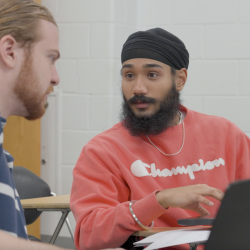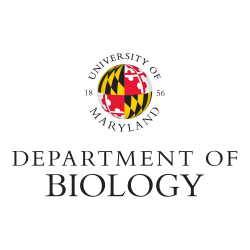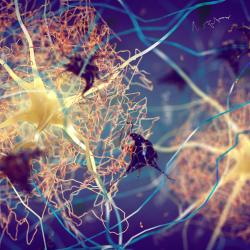Cool Science Courses to Take This Fall at UMD
Ten unique CMNS classes will help undergraduates fulfill general education credits
From examining the mechanisms of black holes to understanding the powerful role of the ocean to analyzing the biological basis of race, and more, the University of Maryland’s College of Computer, Mathematical, and Natural Sciences (CMNS) offers a plethora of cool and interesting classes taught by expert faculty members.
Now that it’s time to register for courses for the Fall 2023 semester, check out 10 unique options from CMNS for undergraduate students to fulfill general education requirements.
AOSC375: Introduction to the Blue Ocean
The global ocean is a major component of the Earth system that shapes life on Earth, including our weather and climate. In this class taught by James Carton, you’ll explore the observation-based interdisciplinary science of oceanography and identify its strong connections to related sciences like meteorology and geography. Students apply this developing understanding to environmental issues such as marine pollution, fish and fisheries, as well as to climate variability and to the changes to the marine environment that are resulting from steadily rising levels of atmospheric greenhouse gasses.
General Education: Distributive Studies - Natural Sciences
ASTR350: Black Holes
Black holes are the most exotic prediction of Einstein's Theory of General Relativity—and the universe seems to manufacture these bizarre objects in copious numbers. In this introduction to the physics and astrophysics of black holes taught by Chris Reynolds, you’ll examine the basic physics of black holes and the nature of stellar-mass black holes and supermassive black holes. Over the course, students dive into the realm of theoretical physics and probe how black holes may provide a route for uncovering new laws of physics governing the structure of space and time.
General Education: Distributive Studies - Natural Sciences
BSCI135: Amazing Green: Plants that Transformed the World
This course taught by Edgar Moctezuma is an interactive way to learn about plants and science, focusing on how plants have changed human history, the biology of their growth—and the science behind their use.
General Education: Distributive Studies - Natural Science Lab and Signature Courses - I-Series
BSCI151: Beyond Race: Human Biological Diversity
Do racial labels have any practical use in understanding human biological diversity? At its core, addressing this question requires understanding the balance between genetic and non-genetic factors underlying human diversity. The course, taught by Kimberly Paczolt, Nicholas Fletcher and Philip Johnson, will help students make an informed critique of the biological basis of race through the study of topics such as: basic biology, data analysis and experimental design, human evolution and genetics, and biomedical research and health outcomes.
General Education: Distributive Studies - Natural Sciences and Distributive Studies - Scholarship in Practice/Diversity - Understanding Plural Societies/Diversity - Understanding Plural Societies
CMSC125: Introduction to Computing
This course taught by Elias Gonzalez introduces you to the computing field as a whole. Spend the semester exploring computing majors at UMD and tech careers while getting experience with computing concepts and hands-on coding.
General Education: Distributive Studies - Scholarship in Practice
GEOL104: Dinosaurs: A Natural History
Learn about all things dinosaur—their evolution and our understanding of their fossil record. In this class taught by Thomas Holtz, you’ll discuss mechanisms of global change ranging from plate tectonics to asteroid impact. Students examine the geologic record and the tools used by paleontologists to determine: geologic ages and ancient environments, evolutionary history and extinctions, dinosaurian biology and behavior, and their survival as birds.
General Education: Distributive Studies - Natural Sciences
GEOL123: Causes and Consequences of Global Change
Study the major components of Earth's climate system and climate change history and learn from Jeff Henrikson about 21st-century climate change prediction, mitigation and adaptation efforts.
General Education: Distributive Studies - Natural Sciences and Signature Courses - I-Series
GEOL200: Earth's Fury: Earthquakes, Volcanoes, and Tsunami
Earthquakes, volcanic eruptions and tsunamis frequently remind us of the dangers associated with living on a constantly changing planet. How do people prepare for these rare but dramatic events? In this course taught by Megan Newcombe, students will study the science behind earthquakes and volcanoes, how it guides monitoring, forecasting, prevention, and response, and the cultural and ethical aspects of these events.
General Education: Distributive Studies - Natural Sciences and Signature Courses - I-Series
PHYS105: A Global Challenge: Energy and Climate Change
This course taught by Jordan Goodman considers the global energy crisis from a scientific perspective. Topics include basic laws of energy and thermodynamics, their effects on energy production and distribution, greenhouse gas, global warming and policy options for decision-makers.
General Education: Distributive Studies - Natural Science Lab and Signature Courses - I-Series






